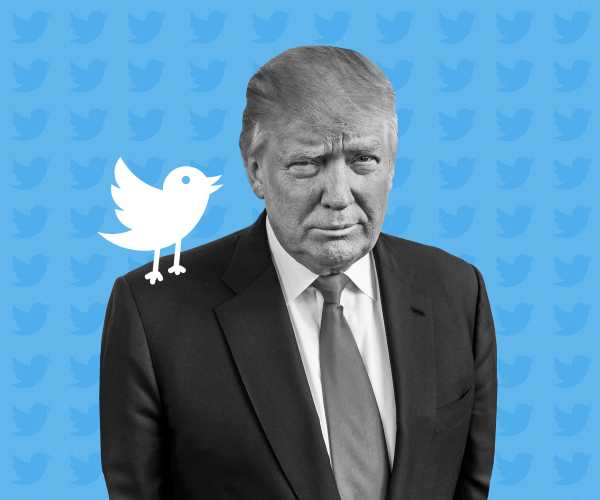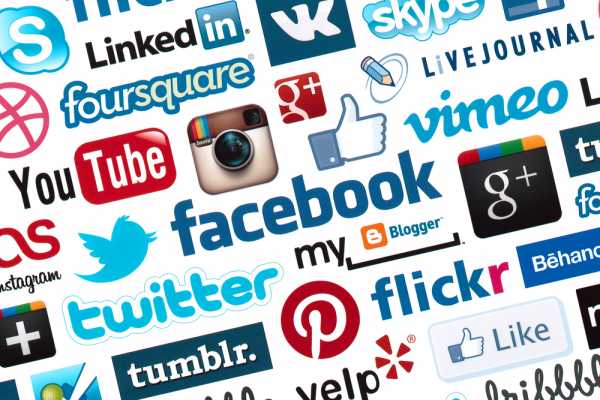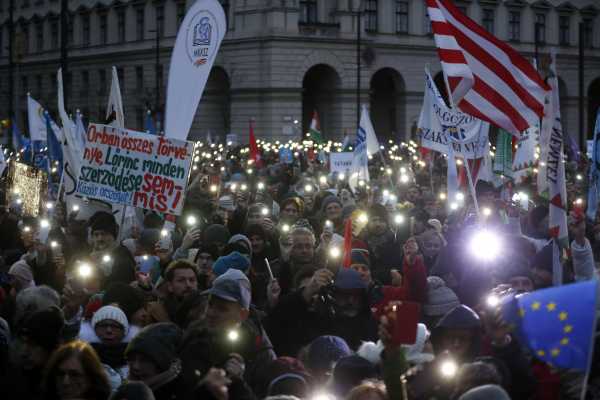
At the inauguration of Brazil’s new far-right president, Jair Bolsonaro, in early January, a crowd of his supporters began a surprising chant. They weren’t cheering for Bolsonaro or his running mate or their party; instead, they were reciting the names of social media platforms.
“Facebook, Facebook, Facebook!” the crowd yelled. “WhatsApp, WhatsApp, WhatsApp!”
They were crediting the platforms with their man’s victory, and they aren’t entirely wrong. During the campaign, a conservative pro-business interest group funded a massive disinformation campaign on WhatsApp (the popular messaging app owned by Facebook). False and damaging information about Bolsonaro’s left-wing opponent, including fake news mocked up to look like neutral fact-checks, spread like wildfire in the runup to the October 8 vote. This deluge, according to one Brazilian expert, played a role in Bolsonaro’s victory.
The glee Bolsonaro’s supporters exhibited points to a troubling development, one familiar to many Americans: Social media, once seen as a profoundly democratic technology, is increasingly serving the needs of authoritarians and their allies.
Many observers have noted that entrenched authoritarian states, like Russia and China, have gotten very good at manipulating these platforms to marginalize domestic dissidents and destabilize democracies abroad. What’s gotten less attention is how authoritarian factions inside democratic states — far-right politicians and parties that are at best indifferent to democratic norms — benefit from the nature of modern social media platforms.
Authoritarians of both sorts benefit from spreading falsehoods about their opponents, ginning up panics about minority groups, and undermining people’s trust in the independent media. Both the 2016 US election and the 2018 Brazilian vote proved social media is a perfect tool for this kind of activity.
Social media can certainly help pro-democracy movements at times, but they overall give far-right parties and authoritarians an advantage. These platforms, once seen as democracy’s ally, have increasingly become its enemy.
It is easier to spread misinformation on social media than to correct it, and easier to inflame social divisions than to mend them. The very nature of how we engage with Facebook and the rest now helps far-right, authoritarian factions weaken the foundations of democratic systems — and even give themselves an easier pathway to seizing power.
It seems we have to admit a somewhat uncomfortable truth: Social media, in the way that it’s used now, is an authoritarian medium.
How the far right exploits social media

The Journal of Democracy is one of the premier academic venues for analyzing the current state of democratic politics. Its most recent issue features an essay from Ronald Deibert, a political scientist and director of the University of Toronto’s tech-focused Citizen Lab, on the role of social media in modern politics. His conclusion is pretty grim.
“It seems undeniable,” Deibert writes, “that social media must bear some of the blame for the descent into neo-fascism.”
Ten years ago, Deibert’s view — now widely shared among journalists and scholars — would have sounded absurd.
In 2009, Iranians rose up to protest against a rigged election, the so-called “Green Movement” using Facebook and YouTube clips of protests to spread their message globally. Two years later, the Arab Spring protests showed the true power of these mediums, as protest movements that made skillful use of social media for coordination and messaging toppled regimes in Tunisia and Egypt.
At the time, the consensus among observers was that social media was, by its very nature, democratizing. Social media facilitates the swift spread of information, allowing citizens to easily get around government censors. Social media allows rapid communication among large groups of disparate people, giving citizen activists new tools for organizing actions. The spread of social media would necessarily weaken authoritarian states and strengthen democracies — or, at least, that’s how the argument went.
There were some dissenters, like the acerbic writer Evgeny Morosov, but they were largely brushed aside in an Arab Spring-induced high. More representative was the 2013 issue of the MIT Technology Review titled “Big Data Will Save Politics,” featuring an interview with the singer Bono declaring that new technologies would be “deadly to dictators.”
This theory turned out to be partly true: It can be difficult to simply repress the spread of information on social media. But as we’ve come to discover, it’s equally difficult to repress the spread of disinformation. The core feature of social media that gives it democratic promise, the rapid spread of information, can be used against democracy via information overload.
A savvy person or political party looking to discredit online critics doesn’t need to ban their speech to hamstring it. Instead, they can respond with a deluge of false or misleading information, making it very hard for ordinary citizens to figure out what’s actually going on.
Deibert’s essay usefully summarizes a number of different studies documenting how well the twisted jiujitsu of misinformation and information overload works:
The WhatsApp propaganda in Brazil is one example of the effect Deibert is talking about. A well-funded campaign to spread false information was extremely difficult for Bolsonaro’s opponents and Brazil’s independent press to expose or discredit. The falsehoods these messages spread likely became truth in the eyes of a significant percentage of people who encountered them, many of whom would never see rebuttals and wouldn’t believe them if they did.
Donald Trump and his allies in the more unscrupulous parts of the American conservative movement employ a similar strategy. The president lies, a lot; while the mainstream press debunks him, right-wing outlets spread those falsehoods or manufactured supporting evidence on social media, where they cement as fact in the eyes of the president’s hardcore supporters.
A recent study found that conservatives were more than four times as likely to share fake news on Facebook as liberals. Another study, from researchers at the University of Oxford, found that conservative users were overwhelmingly more likely to spread “junk news” (defined as outlets that “deliberately publish misleading, deceptive or incorrect information”).
“On Twitter, a network of Trump supporters consumes the largest volume of junk news, and junk news is the largest proportion of news links they share,” the Oxford researchers write. “Extreme hard right [Facebook] pages — distinct from Republican pages — share more junk news than all the other audiences put together.”
We’re seeing the same phenomenon beyond the US and Brazil. The Philippines’ Rodrigo Duterte has cultivated an online fan base — even bringing popular social media influencers into the government — that’s known for “patriotic trolling”: sending hate messages to his critics and spreading smears about them. The Philippine news site Rappler has identified a network of more than 12 million pro-Duterte propaganda accounts on various platforms, reporting that led to a concerted smear campaign against the site from Duterte’s fans. An #UnfollowRappler social media campaign cost the site tens of thousands of Facebook followers, a huge hit for an online publication that depends on clicks to stay profitable.
Social media isn’t the only — or even the primary — reason far-right populists have been able to win elections. There are all sorts of more fundamental reasons, ranging from ethnic divisions to anxiety about crime to the weakness of the political opposition that these leaders have exploited in their rise to power. It would be absurd to blame technology for a phenomenon that has much deeper political roots.
But while the global challenge to democracy from within isn’t social media’s fault, the major platforms do seem to be making this crisis worse. The platforms by their nature allow far-right politicians to marginalize opponents, consolidate their base, and exacerbate the social divisions that helped them rise to power. It helps them act like authoritarians even inside the confines of a democratic political system.
“Social media [outlets] not only are compatible with authoritarianism; they may be one of the main reasons why authoritarian practices are now spreading worldwide,” as Deibert puts it.
Why social media advantages the far right over democracies

But it’s possible we need to go even further than Deibert and the studies he cites. It’s not just that social media is happening to help spread authoritarian behavior as a matter of chance or circumstance. Rather, it’s that the platforms by their very nature give anti-democratic politicians a leg up over their opponents.
To understand why, it’s worth dividing a politician’s use of social media into two basic types: normal use and abuse. Normal use of social media is simply an online extension of typical democratic campaign tactics: paying for ads spreading your message or uploading a campaign video to YouTube. Abuse involves the deliberate spread of false information, attempts to undermine faith in established reality, trolling, and harassment.
Normal use of social media can be equally helpful to all politicians, far-right or otherwise. But the negative use of social media, as in the Trump and Bolsonaro campaigns, intrinsically advantages anti-democratic political factions over their opponents.
Now, spreading misinformation isn’t necessarily a silver bullet for winning elections. It sure seems social media abuse helped Bolsonaro, but the extent is not quite clear. Studies conflict on whether fake news helped Trump win the 2016 election. A review from a group of leading interdisciplinary experts, published in the prestigious journal Science last March, found that there was not yet sufficient evidence to determine how effective abuses of social media are in shifting voting behavior. They could matter, and could even matter a lot; right now, we just don’t know enough to say.
But the abuse of social media can have more subtly corrosive effects on a democracy. Authoritarians don’t win solely by spreading their own message; they win by exploiting conditions under which citizens become either indifferent to democratic institutions or actively hostile to them. By working to increase political apathy and undermining trust in established institutions, far-right parties strengthen themselves at the expense of mainstream parties.
The abuse of social media can be used to inflame these tensions — in essence, providing oxygen to the underlying social trends that produced far-right authoritarians in the first place. When fake news is flying around, no matter who’s spreading it, people lose faith in the trustworthiness of their social institutions or perhaps even in the very idea of truth in politics. The spread of that attitude disproportionately benefits authoritarian factions in elections and weakens democratic ones.
The University of Oxford’s Samantha Bradshaw and Philip Howard put out a report last year on the political abuse of social media platforms in 48 countries. They argue that in each of these cases, the use of tools like fake news and trolling undermine the health of democratic regimes and benefit authoritarians.
“There is mounting evidence that social media are being used to manipulate and deceive the voting public — and to undermine democracies and degrade public life,” they write. “Social media have gone from being the natural infrastructure for sharing collective grievances and coordinating civic engagement, to being a computational tool for social control, manipulated by canny political consultants, and available to politicians in democracies and dictatorships alike.”
Social media disproportionately serves far-right politicians in another way: by helping them stoke social divisions.
Far-right parties demonize out-groups, whether racial minorities, immigrants, or even (in Duterte’s case) drug users. Their arguments center on making these groups look scary and dangerous, and ginning up fear and hatred targeting them.
The ease with which rumors and false information can be spread on social media, and the intrinsic difficulty in debunking these ideas once they’re out there, makes them ideal platforms to spread demagogic messages. You can abuse social media to demonize out-groups, but it’s much harder to do so to improve their images with the public. A study in Germany found that, all other things being equal, areas with higher rates of Facebook use saw higher rates of hate crimes targeting immigrants.
Pro-democracy politicians are much less likely to benefit from these kinds of illiberal messages. Their core supporters are much more likely to hold basic democratic commitments to equality and freedom, and thus they will lose rather than win support by stoking prejudice. The more anger there is out there, the better off anti-democratic forces are.
A BuzzFeed analysis found that between 2012 and 2017, seven of the 10 most popular articles about German Chancellor Angela Merkel on Facebook were false. Merkel is widely seen as a champion of European liberal values and inclusiveness, one of the major bulwarks against the far-right tide on the continent. Three of the seven false articles in the BuzzFeed list were attacks on her immigration record, all focusing on making immigrants seem like threats to Germany and Merkel unreasonably sympathetic.
Social media appears to be better suited to dividing than uniting, at least when it comes to politics. The glut of information, impossible to sort through for the ordinary citizen, shakes people’s understanding of the world and causes them to retreat back to their own biases. Social media, in the way it’s used now, objectively favors authoritarians.
It’s not all bad, is it?

Now, to be fair, there are places where the Arab Spring-era promise of social media hasn’t been extinguished.
In Hungary, where Prime Minister Viktor Orbán has all but stamped out the independent press, Facebook has been a useful tool for citizens who want to counter government propaganda. Citizens opposed to Turkey’s elected authoritarian, President Recep Tayyip Erdogan, have been able to effectively spread anti-Erdogan messages online.
Even in more traditional dictatorships, social media’s democratic potential hasn’t been entirely repressed. The Sudanese government was forced to block a number of platforms in early January in response to a burgeoning protest movement using social media to spread its message.
But all these examples show is that not every authoritarian populist, or even straight-up authoritarian, is good at handling social media. There’s nothing about Hungarian Facebook that makes it more resistant to fake news than Brazilian Facebook. It’s just that Bolsonaro and his supporters have done a better job at realizing social media’s propaganda potential than Orbán and his camp.
It’s best to think of the nature of social media as a medium that gives authoritarians an advantage, but not an insurmountable one. It can end up favoring pro-democracy forces, in certain situations and under the right conditions.
But if both sides are equally skilled, the authoritarians should have a leg up. The deluge of information on social media overwhelms current platforms’ potential to spread important information.
Social media right now is functioning as a kind of parody of the classic “marketplace of ideas” mode of the public square. Instead of the best ideas winning out in free debate, there are so many bad ideas that the good ones simply get drowned out.
In August 2018, MIT Technology Review revisited its 2013 “Big Data Will Save Politics” cover, publishing a series of essays examining whether the technology had lived up to its promise. The overwhelming conclusion was that the magazine had been far too naive.
“Today,” editor-in-chief Gideon Richfield writes, “technology feels as likely to destroy politics as to save it.”
Sourse: vox.com






